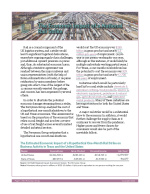The Economic Impact of a National Rail Strike
Published on October 17, 2022

Rail is a crucial component of the US logistics system, and a strike would lead to significant logistical dislocations, exacerbate ongoing supply chain challenges, put additional upward pressure on prices and, thus, do substantial economic harm. Although a tentative agreement was reached between the major railways and union representatives (with the help of Biden Administration officials), it requires ratification by union members before going into effect. One of the largest of the 12 unions recently rejected the package, and concern has been expressed by several others.
The Perryman Group estimates that a hypothetical one-month rail shutdown would cost the US economy over $285 billion in gross product and nearly 1.3 million job-years of employment. (A job-year is one person working for one year, although in this instance, it would likely be multiple individuals working partial years.) For Texas, a one-month rail shutdown has the potential to cost the economy over $29 billion in gross product and nearly 97,700 job-years of employment.
A major rail strike would be a substantial blow to the economy. In addition, it would further challenge the supply chain as it continues to recover from the pandemic. Higher prices and fewer choices for consumers would also be part of the inevitable fallout.
For more details please refer to the full brief.